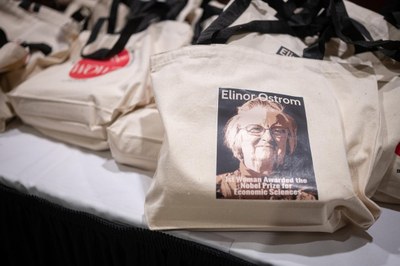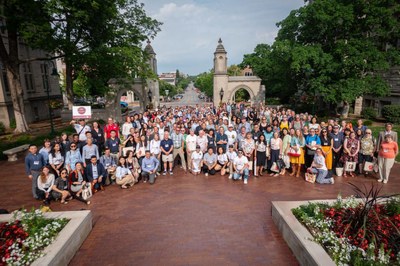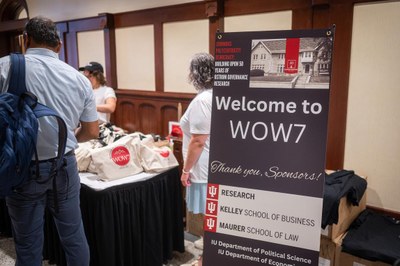Four researchers of the Resource Economics Group went to this year’s Workshop on the Ostrom Workshop (WOW7) in Bloomington, Indiana

After five years, the Workshop on the Ostrom Workshop (WOW7) was again held at Indiana University in Bloomington (IN) in the United States. For around 50 years, the Ostrom Workshop has been advancing and reflecting upon governance and in stitutional research. This is why this year’s conference theme Commons, Polycentricity, & Democracy: Building upon 50 years of Ostrom Governance Research has set the focus on challenges of effective governance due to a more complex and transboundary world. Especially trends in regionalism, autocracy, political polarization are constraining and undermining more participatory forms of governance and demand new approaches. Hence, it was no surprise that from 18th to the 21st of June, nearly 300 attendees came to Bloomington to discuss their latest research on commons, polycentricity and institutions. Four of our researchers attended WOW7 to discuss own and new research findings. The conference was for some of us the first time to meet colleagues in person, e.g. from the IASC Early Career Network. Hence, the conference was a huge success for the whole team.
The audience was ranging from academic scholars to publishers and practitioners. Posters, panels and papers covered diverse theoretical, methodological and empirical topics. The commons were examined from various angles, including, for example, the philanthropy commons, knowledge commons, grassroots commons, authoritarian commons, historical commons, urban commons or tribal politics and the commons. Additionally, topics from a wide range of scholars using the Ostrom frameworks, institutional diversity, institutional fit, polycentricity, trust, bureaucracy, and the institutional grammar, conceptual and epistemological explorations, situation-relational network analysis in social ecological systems research, behavioral and economic experiments and game design and collective action in agroecosystems made a decision to choose a panel difficult. Highlights were also newer approaches such as integrating power theories in institutional analysis, commons governance design in the digital era and web3, feminist political ecology of the commons and institutions, or governing the space commons.
Besides the panels, we could follow the footsteps of Elinor and Vincent Ostrom. There was time to discover the campus and workshop buildings and wandering along Vincent’s and Lin’s former office. Various meet-ups, roundtables and shared dinners offered the possibility to meet colleagues from all over the world, some of them were visiting scholars in our research group in earlier years. The conference concluded with a big banquet awards dinner appreciating and honoring scholars which contributed to the Ostrom workshop throughout the years.
Presentations from our research group:
- Dynamic archetype analysis in sustainability research at the session Archetype analysis in environment and natural resource governance | by Klaus Eisenack
- A computational text analysis approach to investigating public discourse and participation in the case of the 2022 Arizona legislative study committee on housing at the session Applying institutional analysis to study power and systems behavior in polycentricity | by Eve Castille
Save the date: WOW8 is happening in June 2029. See you there!


